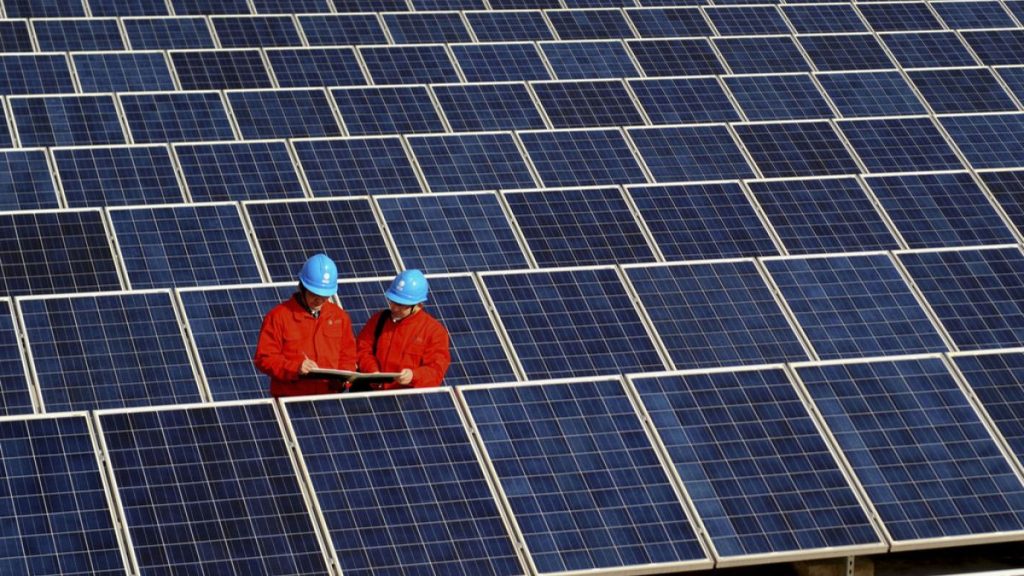Rome’s Fiumicino Airport has embarked on an ambitious journey towards sustainability, establishing itself as a pioneer in the aviation industry’s green transition. The airport has unveiled Europe’s largest airport solar farm, a sprawling 2.5-kilometer array of 55,000 solar panels strategically positioned alongside one of its runways. This innovative use of otherwise idle land not only generates clean energy but also significantly reduces the airport’s reliance on fossil fuels, marking a substantial stride towards its ambitious goal of achieving net-zero emissions by 2030 – a target far more aggressive than those set by most other airports. This bold initiative showcases the airport’s commitment to environmental responsibility and sets a precedent for other airports worldwide.
The solar farm, visible to arriving passengers, provides a striking visual representation of the airport’s dedication to sustainable practices. Located along the eastern side of runway three, the vast expanse of panels underscores the scale of the project and its potential impact. The installation is projected to reduce the airport’s CO2 emissions by over 11,000 tons annually, an equivalent to the energy consumption of 1,477 homes for an entire year. This significant reduction in carbon footprint represents a major step towards mitigating the environmental impact of air travel and promoting a more sustainable future for the aviation sector.
This initial solar installation is merely the first phase of a larger, more comprehensive plan. The airport intends to expand its solar capacity significantly over the next five years, ultimately aiming to generate enough clean energy to power the equivalent of 30,000 Italian homes. This ambitious expansion reflects a long-term commitment to sustainable development and positions Fiumicino Airport as a leader in the global effort to decarbonize the aviation industry. By harnessing the power of renewable energy, the airport is not only reducing its own environmental impact but also contributing to a broader shift towards a cleaner, greener future.
The project’s significance extends beyond the airport itself, serving as a model for other industries and regions seeking to embrace renewable energy solutions. Italy’s Minister of Environment and Energy Security, Gilberto Pichetto Fratin, emphasized the project’s potential to demonstrate how decarbonization can be achieved not through sacrifice but through innovation and modernization. A new Italian ministerial decree further supports this vision, encouraging the utilization of unused land, such as abandoned quarries and areas along highways and rail tracks, for renewable energy projects. This proactive approach aims to maximize the potential of underutilized spaces for the benefit of the environment and the economy.
Airports, by their nature, are energy-intensive operations, requiring substantial power to maintain their myriad functions. This inherent energy demand makes the integration of renewable energy sources all the more crucial in mitigating their environmental impact. By generating their own clean energy, airports can significantly reduce their reliance on fossil fuels and contribute to the broader green transition. Marco Troncone, CEO of Aeroporti di Roma, highlighted how the solar farm, along with the adoption of electric vehicles for airport operations, forms a key part of the airport’s comprehensive strategy towards achieving net-zero emissions within the next four to five years. This multifaceted approach underscores the airport’s commitment to holistic sustainability.
The initiative has also garnered praise from Italian environmental NGO Legambiente, which sees the project as a potential model for sustainable growth not only in Italy but also globally. The organization expressed hope that both Fiumicino Airport and Italy as a whole can inspire and lead the development of a thriving green economy worldwide. This endorsement from a respected environmental organization further validates the project’s significance and reinforces its potential to serve as a catalyst for wider adoption of sustainable practices within the aviation industry and beyond. The Fiumicino solar farm represents a significant step towards a more sustainable future for air travel, demonstrating that environmental responsibility and economic progress can go hand in hand.









